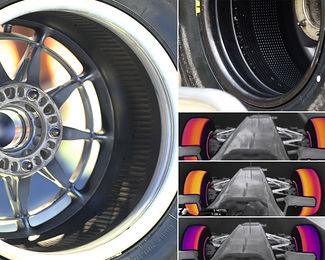Wheel rim coatings to heat the tyres
Even though it's been known for a while, recent thermal imagery has shown the true effects of rim coatings to manage tyre temperatures. The coatings were first photographed on Mercedes AMG's Advanti wheels, featuring dimples on the inside of the rim as well (inset). Later on, Red Bull was confirmed to also use a similar treatment of their OZ Racing wheels, although in their case the inside of the wheels features grooves rather than dimples. Ferrari meanwhile are said to be coating their OZ Racing wheels as well.
It was recently also found out that the black coating is actually Polysil, produced by Nanoprom near Sassuola, Italy. It is a solvent based product containing polymers of silicium, mainly designed to protect all sorts of materials against surface friction. The product is typically sprayed to create a film of only a few microns to reach hardnesses of up to 9H. This is achieved mainly by letting the product fill up tiny gaps in the imperfect wheel surface, creating a very smooth result that may also help to reduce turbulence within the wheel.
Its black colour however is interesting for teams as that will help for the rim to absorb heat from the brakes into the Magnesium alloy wheel itself. As the rim itself has a very high thermal conductivity, the heat going into the metal is then spread rapidly throughout its entire body and partially transferred into the tyre through the tyre bead. As a result, it is possible for teams to keep the tyres at a more constant temperature, reducing the rapid drop of temperature of the tyres when running on long straights. Instead, with the rim properly warmed up, the tyre wall is kept warm, preventing the tyre's thread to cool off too quickly. The net result is more grip at turn-in as the tyres haven't cooled down as much as without the treatment.
The thermal images in the inset show how this works brilliantly for Red Bull Racing. All three are shots from an onboard camera on Sebastian Vettel's car at Circuit of the Americas during Q1 at the US Grand Prix. The first is taken on approach to turn 19, the second shows the turn-in point on turn 19, and the one below shows him at the end of the pit straight, before braking. It is evident that in all three images, the rim is relatively warm, and that by the end of the straight, the tyres are still lighting up across the entire thread's width. Similar images from Mercedes AMG show similar, but less pronounced effects, while on the Ferrari the wheel was not marked as hot by the thermal camera, indicating a lower temperature than with the other teams.
Even though it is still early days and nobody knows yet what will be the operating temperatures of the new 'conservative' Pirelli tyres, it is nonetheless very likely that this technology will continue to be used in 2014. Even more so, with Nanoprom citing the possibility to use their coatings on composites and aluminium, it is nearly sure that it is or will be used on parts of the engine as well.


I suggest a correction, the name of the city is Sassuolo, not Sassuola